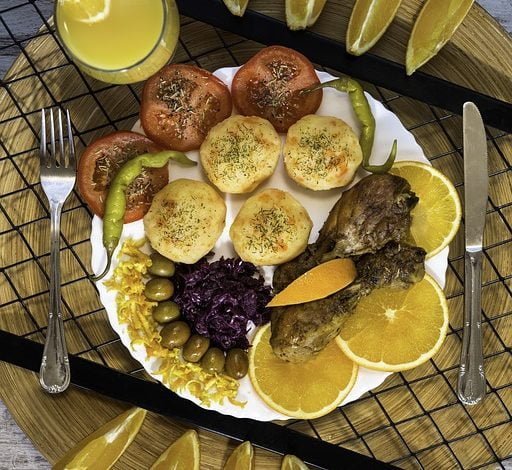
How can cancer determine your diet?
How can cancer determine your diet?
d Doctors often recommend a specific diet for patients based on their medical condition: more fiber and less red meat for those with heart disease, low-sugar foods for diabetics, and a gluten-free diet for celiac patients, for example. But did you know that the same can be true for some cancer patients? While a healthy diet looks very similar before cancer as it does after it — lean protein, lots of fruits and vegetables, lots of water — cancer experts have developed nutritional guidelines tailored to patients with certain types of cancer.
“All people, whether or not they have cancer, should avoid or limit smoked, cured or salted processed meats: deli meats, ham, hot dogs, bacon, and sausages. Laboratory studies have shown that nitrates and nitrites, which are commonly added as preservatives to meat, manufactured, they can form compounds linked to cancer.” — Carolyn Lammersfeld, MBA, MSc, RD, CSO, LD, vice president of integrative medicine at Cancer Care Centers of America® (CTCA).
Cancer patients, regardless of the type of malignancy they have, should avoid alcohol. “Alcohol contains ethanol, which is a carcinogen that can damage DNA,” Lammersfeld says. “Even one drink a day for women can increase the risk of breast cancer. The reason is not entirely clear, other than alcohol contains ethanol, which can raise levels of circulating estrogen and the interactions between alcohol, nutrients and genes. Two drinks a day, while women should not have More than one drink a day, and a drink is defined as 12 ounces of beer, a five-ounce glass of wine, or 1.5 ounces of a strong alcoholic beverage.
Depending on the type of cancer you have, consider the nutritional recommendations below to help reduce potential side effects associated with treatment while helping to improve your quality of life and chances for better outcomes.
breast cancer
A strong relationship has been established between breast cancer and excess body fat, which can increase estrogen and insulin production, leading to chronic low-level inflammation, which can damage DNA and allow cancer cells to grow.
Eat a little of this :
- Saturated fats, including high-fat meat and poultry with the skin, butter, coconut, coconut oil, palm kernel oil, lard, and whole dairy products such as milk, cheese, and ice cream.
- Alcohol, which has been linked to an increased risk of cancer and its recurrence.
- sugary drinks
Eat more of this :
- Fiber, which includes bran, whole grains, vegetables, fruits, and beans (at least 21 grams per day or four to six daily servings of beans and/or legumes, nine servings of vegetables and fruits per day with a variety of colors) to help you feel full By eliminating weight control and possibly helping with that.
- Cruciferous vegetables, such as broccoli, cauliflower, Brussels sprouts, cabbage and kale, contain sulforaphane that can help detoxify carcinogens and prevent tumor growth.
- Omega-3 fatty acids in food (three to four ounces or ½ cup of peeled fish twice a week, such as salmon, halibut, tuna, mackerel, anchovies, herring, and sardines). People with heart disease or high triglycerides may want to talk to their doctor about taking a daily supplement.
Endometrial/uterine cancers
Women with these cancers should follow a plant-based diet, try to maintain a healthy weight, and engage in at least 2.5 hours of physical activity per week.
Eat a little of this :
- Saturated fats found in foods such as whole dairy products, lard, butter, cream, cheese, lamb, pork, skinless poultry, and fatty beef.
- High-fat dairy products, because they are higher in saturated fat and more calories than low-fat foods
- High-glycemic foods such as sugary drinks and processed foods, such as high-glycemic diets, have been associated with an increased risk of endometrial cancer.
Eat more of this :
- Non-starchy vegetables such as leafy greens, peppers and carrots
- Whole grains like brown rice, quinoa and oatmeal
- Legumes, such as beans, peas and peanuts, are a substitute for meat and a good source of fiber and phytochemicals.
- A variety of fruits for a natural sweetener to help cut back on sugary drinks and processed foods.
- Whole fruit instead of juice
colorectal cancer
Patients with this cancer must maintain a healthy weight and remain active, as excess weight is the biggest risk factor for developing this disease.
Eat a little of this :
- Red and processed meat
- alcohol
- Sugary drinks and processed foods, which can make it difficult to reach and maintain a healthy weight.
Eat more of this :
- Whole-grain foods with fiber (21-38 grams per day) to aid in regular bowel movements and to help eliminate harmful substances
- Calcium (1,000 mg to 1,200 mg per day), either through a calcium-rich diet (a glass of low-fat milk contains 300 mg of calcium), through the use of supplements, or a combination of foods and supplements.
- Vitamin D, which can help with cell growth and immune function (600 IU per day for adults under 70 and 800 IU per day for adults over 70; food sources include fatty fish like salmon, tuna, and sardines; low-fat milk, yogurt, and eggs, although that many people need supplemental vitamin D in addition to food)
esophageal cancer
Patients with this cancer should maintain a healthy diet, as increased body weight is associated with an increased risk of esophageal cancer. Regular exercise can also help reduce risk.
Avoid this :
- Alcohol, as it is associated with an increased risk of developing this type of cancer.
- Processed meat
Eat more of this :
- Fruits and vegetables (five to nine servings a day), mix diet with carotenoids (carrots, sweet potatoes, watermelon, apricots, spinach), citrus fruits (oranges, grapefruit and other fruits rich in vitamin C), garlic greens (garlic, chives, chives, onions) and vegetables Leafy (sprouts of spinach, kale, chard, turnip and mustard greens)



